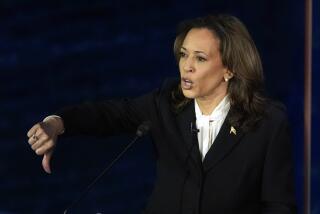Pro: Seal the Victory of Cold War
Having just returned from Poland, Hungary and the Czech Republic, I feel more convinced than ever that the U.S. Senate should demonstrate overwhelming bipartisan support for including these countries in NATO.
NATO is America’s most critical security alliance, and those who have been expressing anxiety of late about its enlargement are overstating the risks.
The primary misgiving about expansion would seem to be that we cannot afford to provoke Russia with such action. Certainly, we must be concerned about the consequences of our foreign policy initiatives. However, if the Cold War validated anything, it was the worth of framing U.S. foreign policy from first principles rather than hypothetical situations.
We engaged in the Cold War and won it because we were unswerving in our belief in democracy and individual freedoms. We have no reason today to be any less passionate in our defense of these principles. Nor do we have any grounds for walking away from our long-held conviction that stability and prosperity in Europe--which NATO expansion will widen and deepen--will strengthen our security and well-being.
But what of Russia? I would argue that NATO expansion ultimately will prove as much a boon for Russia as for us and our current and prospective European allies.
The clear message emerging from Moscow is that the enlargement of NATO to include Poland, Hungary and the Czech Republic already is accepted there as an accomplished fact. Indeed, in recent public statements, Foreign Minister Yevgeny Primakov has set as a priority the establishment of good relations with Russia’s former satellites.
Why should we believe what we are hearing? Because history has taught the Russians, perhaps better than us, the threat posed when instability reigns in Eastern and Central Europe. They also understand that, insofar as NATO enlargement is the stabilizing force for these emerging free markets, Russia will be a beneficiary. Certainly, they see that the potential flash points of ethnic and religious strife in the region more likely will be managed--and perhaps even managed out of existence--in the presence rather than the absence of NATO. Remember, too, that Russia already is intimately engaged with NATO in Bosnia and, institutionally, through the Founding Act.
But the Russia card is not the only one being played by the opponents of NATO expansion. Cost is another consideration, the critics say.
The cost of expanding NATO to include Poland, Hungary, and the Czech Republic is small. For the 16 existing members, it is expected to total about $1.5 billion. For each American taxpayer, that amount breaks out annually over the next 10 years to less than the price of a candy bar.
The bipolar world that gave rise to the alliance no longer is operative, and NATO is redefining itself in light of the new realities.
All to the good, the critics say, but what of the argument that the fledgling free market states of Eastern and Central Europe should first become members of the European Union? I would vigorously concur that EU membership does make sense for Poland, Hungary and the Czech Republic. But considering the difficulties that Western Europe has experienced in forging this union, it probably is politically unrealistic to think that places for additional members can be arranged any time soon.
In any case, EU membership for the countries of Eastern Europe should not be viewed as a substitute for NATO expansion. After all, we cannot abdicate America’s security interest to an organization in which we play no real role.
Meanwhile, there are urgencies to expanding NATO. It is nearly 10 years since the fall of the Berlin Wall, and the countries of Eastern Europe--including my native land, Poland--have waited long enough for a place at the table where they have yearned to be for so long.
The ineluctable fact remains: The Cold War is over and it’s time for new thinking that goes beyond the old arguments. It’s also time for movement, and the notion of “pause”--a forced delay of some number of years in any consideration of NATO expansion beyond Poland, Hungary and the Czech Republic--strikes me as an ill-advised overreaction to hypothetical situations that we simply don’t know will occur.
NATO enlargement is not against Russia. It is for expanded democracy, free markets, stability and peace in partnership with Russia. And, once the Senate deliberates the issue, I trust it will signal that the separation of East and West has been consigned to where it belongs--the dustbin of history.
More to Read
Sign up for Essential California
The most important California stories and recommendations in your inbox every morning.
You may occasionally receive promotional content from the Los Angeles Times.










